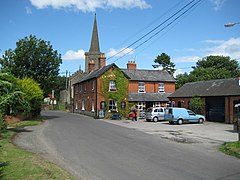Bishops Cannings
| Bishops Cannings | |
|---|---|
 The Crown Inn in Bishops Cannings with the church of St Mary the Virgin behind |
|
| Bishops Cannings shown within Wiltshire | |
| Population | 1,784 (in 2011) |
| OS grid reference | SU038642 |
| Civil parish |
|
| Unitary authority | |
| Ceremonial county | |
| Region | |
| Country | England |
| Sovereign state | United Kingdom |
| Post town | Devizes |
| Postcode district | SN10 |
| Dialling code | 01380 |
| Police | Wiltshire |
| Fire | Dorset and Wiltshire |
| Ambulance | South Western |
| EU Parliament | South West England |
| UK Parliament | |
Bishops Cannings is a village and civil parish in the Vale of Pewsey in Wiltshire, England, about 3 miles (5 km) northeast of Devizes. The parish includes the village of Coate and the hamlets of Bourton, Horton and Little Horton.
Streams which become the Salisbury Avon flow through the parish. The northern part of the parish lies on the Marlborough Downs, including Morgan's Hill and part of Roundway Hill.
Bishops Cannings village is about 0.5 miles (0.80 km) south of the A361 road which links Devizes with Avebury and Swindon.
The manor of Cannings was recorded in the 1086 Domesday Book as held by the Bishop of Salisbury.
Horton is first attested in 1158. The place-name is a common one in England and derives from Old English horu 'dirt' and tūn 'settlement, farm, estate', presumably meaning 'farm on muddy soil'.
In the 16th and 17th centuries, Bourton manor was an estate of the Ernle family. The manor included the hamlet of Easton; today the name survives only at Easton Farm and Easton Down.
The Wansdyke medieval earthwork crosses the north of parish. The Kennet and Avon Canal (opened in 1810) was built through the parish, passing between Bishops Cannings and Horton.
The parish is now the third largest in Wiltshire, but was formerly larger. It lost a large area to the nearby town of Devizes when there was a change of boundaries in 1835. Bishops Cannings had previously reached as far into Devizes as the Crammer, a large pond on the edge of the town centre. This may explain how Bishops Cannings comes to lay claim to being the place of origin of the legend of the Moonrakers. Next to the pond is the 15th-century church of St James, which was a chapelry of Bishops Cannings.
...
Wikipedia

